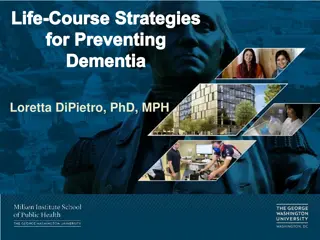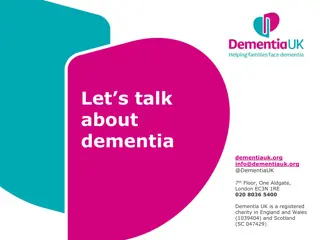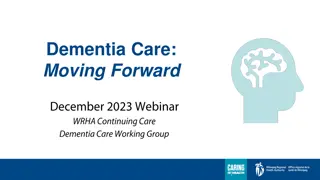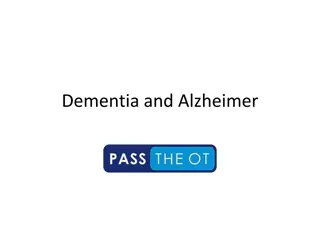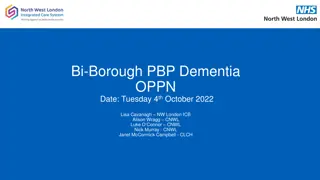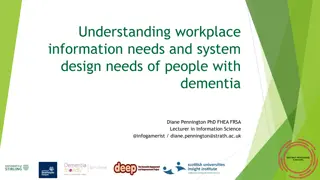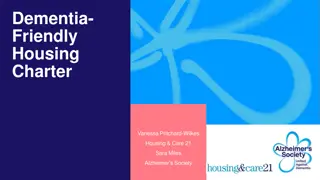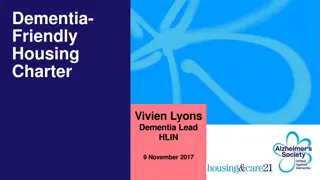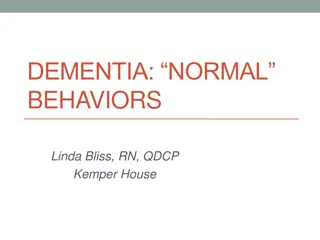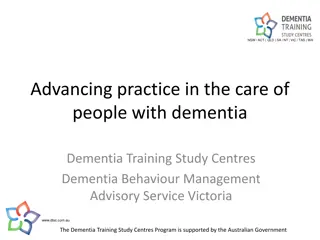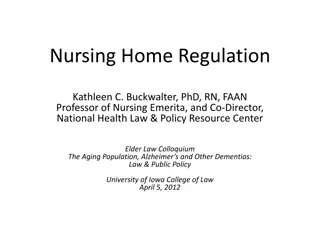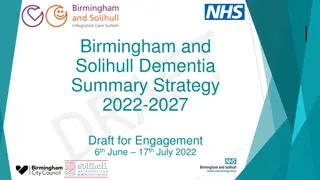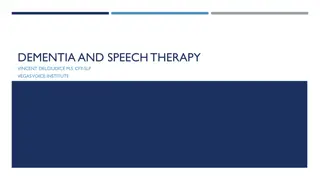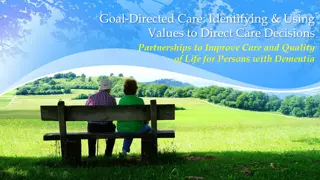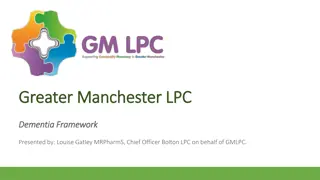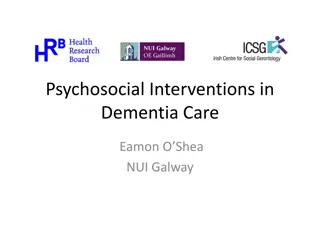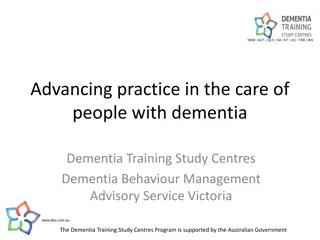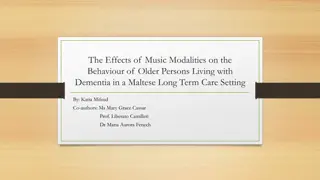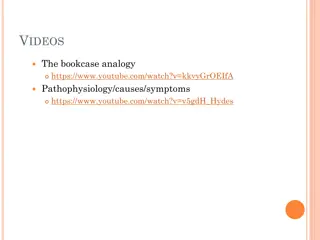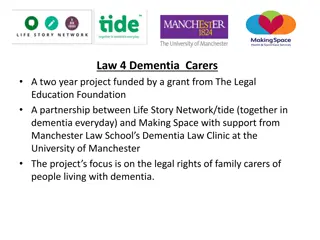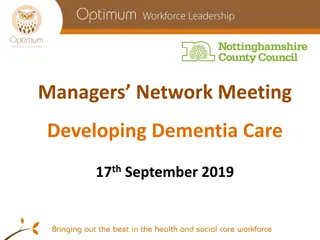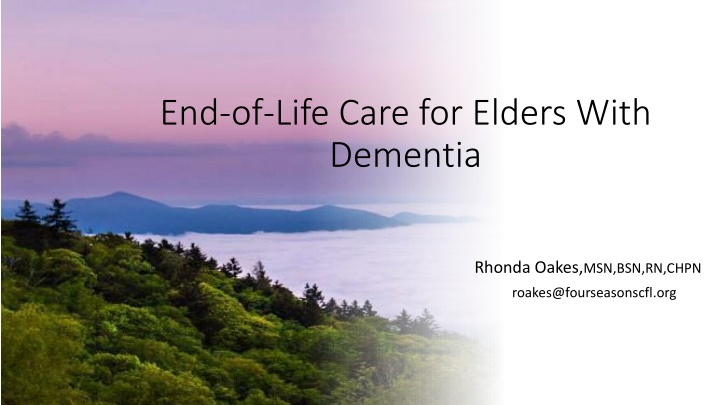
Understanding End-of-Life Care for Elders with Dementia
Learn about the importance of early end-of-life care for elders with dementia, the unique journey each elder experiences, cultural considerations in care, and how to honor traditions while supporting the elder and family.
Download Presentation

Please find below an Image/Link to download the presentation.
The content on the website is provided AS IS for your information and personal use only. It may not be sold, licensed, or shared on other websites without obtaining consent from the author. If you encounter any issues during the download, it is possible that the publisher has removed the file from their server.
You are allowed to download the files provided on this website for personal or commercial use, subject to the condition that they are used lawfully. All files are the property of their respective owners.
The content on the website is provided AS IS for your information and personal use only. It may not be sold, licensed, or shared on other websites without obtaining consent from the author.
E N D
Presentation Transcript
End-of-Life Care for Elders With Dementia Rhonda Oakes,MSN,BSN,RN,CHPN roakes@fourseasonscfl.org
Dementia at-a-glance Dementia is a general term for a chronic or persistent decline in mental processes including memory loss, impaired reasoning, and personality changes. Alzheimer s disease is the most common form of dementia, accounting for 60-80% of all cases of dementia. Dementia is the 6thleading cause of death in the United States, and over 5 million Americans are currently living with Alzheimer s disease.
End-of-Life Care Being open to end-of-life care early gives the Elder/family resources/options that ensures care aligns with what is important. End-of-Life care focuses on: physical comfort, mental and emotional needs, spiritual needs, and practical tasks. In addition to the patient, the family of the dying person needs support as well, with practical tasks and emotional distress. The team supports the Elder/family better when the care begins earlier during the terminal decline. National Institute on Aging, 2022
Each Elders Journey is Unique Dementia is typically a slow progressive disease The decline occurs over time Culture, spirituality, and family beliefs should be an integral part of the care choices to be considered Being open to end-of-life care early gives the Elder/family resources/options that ensures care aligns with what is important. What is most important to you?___________ What does the care to support most important look like?
Culture and Care Cultural considerations American Indian/Alaska Native communities hold family sacred, family obligation and a culture of respect for Elders and their care. Family goal is to seek care that aligns with culture, spirituality, and family belief system regarding end-of-life care. Choices: Caring for the Elder at home or in a facility are both good choices. Some families may choose to take the Elder home at the very end so the family can keep vigil, or they have selected a facility that does not restrict family during the last days of life. The goal is to seek the care that aligns with your family needs that best serves the Elder and supports what is most important.
Culture What is important for your health care team to honor as they care for the Elder? Examples of a show of respect that families felt honored their culture: Removing my shoes as I enter homes where that is the norm Greeting and addressing the Matriarch of the family first if that is expected Not staring at someone if direct eye contact is considered rude Assisting with kinship and keeping family in other tribes informed of Elder s status if Elder/family appts approval for sharing information and with who Eating when offered food, and expected to eat Are there specific culture actions that would make the Elder/family feel honored and supported?
Spirituality What is important for your health care team to honor as they care for the Elder? Examples of a show of respect that families felt honored their spirituality: Knowing their preferred faith (if one) and ensuring spiritual care aligns with those tenants Trained to religion neutral: We know we have honored the Elder/family and respected their preferred faith (if one) when the Elder/family tells you you must believe what we believe you understand me Are there specific rituals that would make the Elder/family feel honored and supported?_________________
Family Beliefs What is important for your health care team to honor as they care for the Elder? Examples of a show of respect that families felt their family beliefs were honored: Ensuring time in the visit to listen as the family shares their life experiences Finding replacement words if certain words holds a strong negative stigma and is not spoken. Many find the words comfort care acceptable instead of the term hospice care Are there specific family beliefs that would make the Elder/family feel honored and supported?
Questions to Ask Talk about the uncomfortable topics before the confusion is severe Ensuring the Elder understands there is no cure and what would they want done or not done? What if you can t care for yourself? What if the wound will not heal? What if the infection will not heal? What if you can t swallow? What if your heart stops? Having answers will help you make the best medical decisions possible
What if the Elder is not able to answer? As a family do you recall the Elder ever stating something to the effect Don t let them bring me back if my heart stops Don t let them put me on a machine to keep me alive If I can t care for myself and there is no cure, don t give me artificial food to keep me here Don t let me suffer from treatments that hurt if they can t cure me I feel for (person they have visited) I would not want to live like that with all those tubes. Again, recollecting any preferences they shared will help you make the best medical decisions possible.
What if the Elder does not understand/unresponsive and never shared what they would want in any format? The burden of the decisions fall to the health care surrogate or family. It is so important to begin advance care planning and working through what is okay and not okay to help your healthcare team provide the desired care. The Elder s physician can explain what the options are if the Elder: The Elder is in the terminal phase of the illness Is no longer able to care for themself Has a wound that will not heal Gets an infection that does not respond to treatment/heal. Is not able to swallow Heart stops
Resources to Chart the Course What is advance care planning? Advance care planning decisions Getting started with advance care planning Making your advance care wishes known How to choose your health care proxy Making your health care directives official What to do after you set up your advance directive Be prepared
Resources continued What is end-of-life care? End of life: Providing physical comfort End of life: Managing mental and emotional needs Spiritual needs at the end of life Providing support for practical tasks
End Stage Dementia Dependent on caregiver for personal care; dressing, bathing, transfers walking Incontinent of bowel and bladder Unable to communicate meaningfully Impaired nutritional status or difficulty swallowing or refusing to eat Weight loss over 11% of body weight or Body Mass Index less than 18 Albumin less than 3.1 (lab result the physician can provide)
End Stage Dementia Contd Additional illnesses associated with advanced dementia include: Aspiration pneumonia Upper urinary tract infection Septicemia Decubitus ulcers, multiple, stage 3-4 Fever recurrent after antibiotics
Co-morbid conditions that add burden of illness if Dementia is present Congestive heart disease or cardiovascular disease COPD or restrictive lung disease Cerebrovascular disease, including stroke Diabetes mellitus Renal insufficiency Malignancy
References Browne CV, Ka'opua LS, Jervis LL, Alboroto R, Trockman ML. United States Indigenous Populations and Dementia: Is There a Case for Culture-based Psychosocial Interventions? Gerontologist. 2017 Nov 10;57(6):1011-1019. doi: 10.109 de la Monte SM, Wands JR. Alzheimer's disease is type 3 diabetes-evidence reviewed. J Diabetes Sci Technol. 2008 Nov;2(6):1101-13. doi: 10.1177/193229680800200619. PMID: 19885299; PMCID: PMC2769828. 3/geront/gnw059. PMID: 27048710; PMCID: PMC6281323. National Institute on Aging Caring for a Person with Late-Stage Alzheimer s Disease

